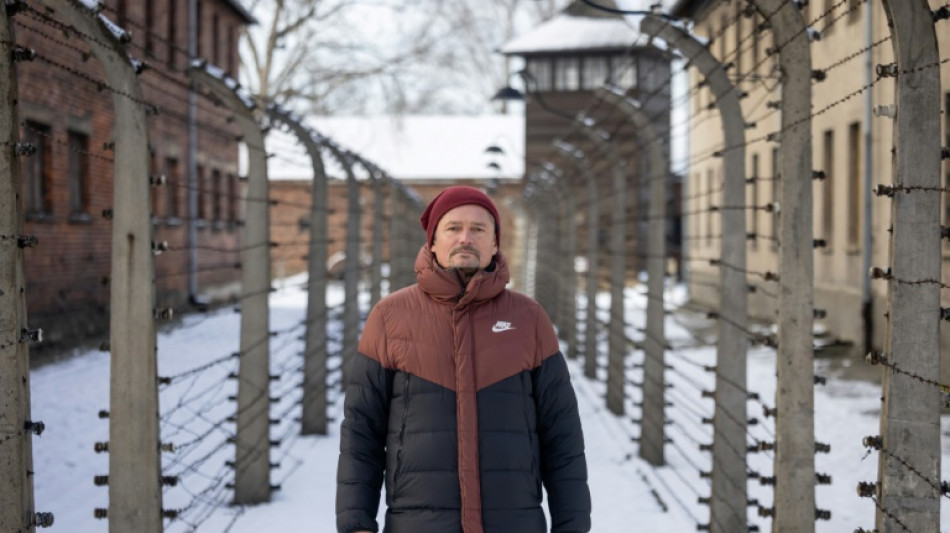
-
 Leaders Inter level with Napoli after falling to late Orsolini stunner at Bologna
Leaders Inter level with Napoli after falling to late Orsolini stunner at Bologna
-
David rediscovers teeth as Chevalier loses some in nervy Lille win

-
 Piastri wins Saudi Arabian Grand Prix, Verstappen second
Piastri wins Saudi Arabian Grand Prix, Verstappen second
-
Kohli, Rohit star as Bengaluru and Mumbai win in IPL

-
 Guirassy helps Dortmund past Gladbach, putting top-four in sight
Guirassy helps Dortmund past Gladbach, putting top-four in sight
-
Alexander-Arnold lauds 'special' Liverpool moments

-
 Pina strikes twice as Barca rout Chelsea in Champions League semi
Pina strikes twice as Barca rout Chelsea in Champions League semi
-
Rohit, Suryakumar on song as Mumbai hammer Chennai in IPL

-
 Dortmund beat Gladbach to keep top-four hopes alive
Dortmund beat Gladbach to keep top-four hopes alive
-
Leicester relegated from the Premier League as Liverpool close in on title

-
 Alexander-Arnold fires Liverpool to brink of title, Leicester relegated
Alexander-Arnold fires Liverpool to brink of title, Leicester relegated
-
Maresca leaves celebrations to players after Chelsea sink Fulham

-
 Trump eyes gutting US diplomacy in Africa, cutting soft power: draft plan
Trump eyes gutting US diplomacy in Africa, cutting soft power: draft plan
-
Turkey bans elective C-sections at private medical centres

-
 Lebanon army says 3 troops killed in munitions blast in south
Lebanon army says 3 troops killed in munitions blast in south
-
N.America moviegoers embrace 'Sinners' on Easter weekend

-
 Man Utd 'lack a lot' admits Amorim after Wolves loss
Man Utd 'lack a lot' admits Amorim after Wolves loss
-
Arteta hopes Arsenal star Saka will be fit to face PSG

-
 Ukrainian troops celebrate Easter as blasts punctuate Putin's truce
Ukrainian troops celebrate Easter as blasts punctuate Putin's truce
-
Rune defeats Alcaraz to win Barcelona Open

-
 Outsider Skjelmose in Amstel Gold heist ahead of Pogacar and Evenepoel
Outsider Skjelmose in Amstel Gold heist ahead of Pogacar and Evenepoel
-
Arsenal make Liverpool wait for title party, Chelsea beat Fulham

-
 Trump slams 'weak' judges as deportation row intensifies
Trump slams 'weak' judges as deportation row intensifies
-
Arsenal stroll makes Liverpool wait for title as Ipswich face relegation

-
 Sabalenka to face Ostapenko in Stuttgart final
Sabalenka to face Ostapenko in Stuttgart final
-
Kohli, Padikkal guide Bengaluru to revenge win over Punjab

-
 US aid cuts strain response to health crises worldwide: WHO
US aid cuts strain response to health crises worldwide: WHO
-
Birthday boy Zverev roars back to form with Munich win

-
 Ostapenko eases past Alexandrova into Stuttgart final
Ostapenko eases past Alexandrova into Stuttgart final
-
Zimbabwe on top in first Test after Bangladesh out for 191

-
 De Bruyne 'surprised' over Man City exit
De Bruyne 'surprised' over Man City exit
-
Frail Pope Francis takes to popemobile to greet Easter crowd

-
 Lewandowski injury confirmed in blow to Barca quadruple bid
Lewandowski injury confirmed in blow to Barca quadruple bid
-
Russia and Ukraine accuse each other of breaching Easter truce

-
 Zimbabwe bowl Bangladesh out for 191 in first Test in Sylhet
Zimbabwe bowl Bangladesh out for 191 in first Test in Sylhet
-
Ukrainians voice scepticism on Easter truce

-
 Pope wishes 'Happy Easter' to faithful in appearance at St Peter's Square
Pope wishes 'Happy Easter' to faithful in appearance at St Peter's Square
-
Sri Lanka police probe photo of Buddha tooth relic

-
 Home hero Wu wows Shanghai crowds by charging to China Open win
Home hero Wu wows Shanghai crowds by charging to China Open win
-
Less Soviet, more inspiring: Kyrgyzstan seeks new anthem

-
 Defending champion Kyren Wilson crashes out in first round of World Snooker Championship
Defending champion Kyren Wilson crashes out in first round of World Snooker Championship
-
NASA's oldest active astronaut returns to Earth on 70th birthday

-
 Exec linked to Bangkok building collapse arrested
Exec linked to Bangkok building collapse arrested
-
Zelensky says Russian attacks ongoing despite Putin's Easter truce

-
 Vaibhav Suryavanshi: the 14-year-old whose IPL dream came true
Vaibhav Suryavanshi: the 14-year-old whose IPL dream came true
-
Six drowning deaths as huge waves hit Australian coast

-
 Ukrainian soldiers' lovers kept waiting as war drags on
Ukrainian soldiers' lovers kept waiting as war drags on
-
T'Wolves dominate Lakers, Nuggets edge Clippers as NBA playoffs start

-
 Taxes on super rich and tech giants stall under Trump
Taxes on super rich and tech giants stall under Trump
-
Star Wars series 'Andor' back for final season


'Our mission': Auschwitz museum staff recount their everyday jobs
Barbed wire lines the road to work for Pawel Sawicki, deputy spokesman of the Auschwitz museum at the site of the former Nazi death camp that was liberated 80 years ago this month.
More than one million people died at the Auschwitz-Birkenau camp built by Nazi Germany when it occupied Poland in World War II -- most of them Jews, but also non-Jewish Poles, Roma and Soviet soldiers.
Around 850 people work at the museum to preserve their memory, a job with more emotional baggage than your usual nine-to-five.
"They say that when you start working here, either you leave very quickly because the history is too much or you stay for a long time," said Sawicki, who is in charge of social media at the museum and has worked there for 17 years.
"It helps if you find some meaning to the mission," the 44-year-old told AFP.
Sawicki's office is located inside a former hospital for the Nazis' notorious SS.
Behind the building there is an old gas chamber and farther on stands the camp's "Arbeit Macht Frei" (Work Will Set You Free) gate.
To cope with the heavy emotional toll of working at Auschwitz, Sawicki said he has put up "a sort of professional barrier" that keeps him sane, even if it cracks from time to time.
- Not a word -
Jacek Paluch, a longtime Auschwitz tour guide, said he makes sure to leave his "work at work" to avoid going crazy.
"But it's a special job, and a special place. It's impossible to leave all the history behind and not take it home with you," he told AFP.
The 60-year-old said he leads up to 400 groups of visitors each year around the former death factory.
More than 1.8 million people from across the world visited Auschwitz last year.
The museum offers tours of the site in more than 20 languages, led by around 350 guides.
The hardest, most emotional moments for Paluch are his encounters with former prisoners.
Once, Paluch came across a man sitting silently -- and unresponsive to questions -- on a bench, his arm tattooed with his former inmate number.
"His whole life, he never spoke a word to his family about what had happened here. Then, suddenly, at one Sunday breakfast, he began to talk," Paluch said.
"They stopped him and took him here so that he could tell his story where it happened," he continued.
"But when he walked through the 'Arbeit Macht Frei' gate, the memories came back. He went quiet again and no longer wanted to talk about any of it."
- 'Importance as evidence' -
Paluch said he knows when the job has taken its toll.
"A sign of fatigue, not necessarily physical but more mental, is when I have dreams at night that I'm leading groups," he said.
"That's when I realise I need to take some time off."
Wanda Witek-Malicka, a historian at the museum's research centre, had for years focused on child inmates of Auschwitz. But she had to abandon the difficult subject when she became a mother.
"At that moment, this particular aspect of Auschwitz history -- children, pregnant women, newborns -- I was in no state to handle it," she told AFP.
"The emotional weight of the site and the history was too much for me," the 38-year-old added.
Were the museum staff to reflect on the site's history round the clock "we'd probably be unable to get any work done".
Elsewhere at the site, conservator Andrzej Jastrzebiowski examined some metal containers once filled with Zyklon B, the poison gas used to kill inmates at Auschwitz.
He recalled his anger early on -- he has worked at the museum for 17 years -- when he had to conserve objects that had belonged to the Nazis.
"Later, I realised these objects had importance as evidence of the crimes committed here, and maintaining them is also part of our mission here," the 47-year-old told AFP.
- 'Give them a voice' -
Jastrzebiowski and his colleagues at the high-tech conservation department are responsible for preserving hundreds of thousands of items, including shoes, suitcases, metal pots, toothbrushes, letters and documents.
Most of the items had belonged to inmates before being confiscated upon arrival.
The conservators are also responsible for preserving the camp barracks, the barbed wire, and the remnants of the blown up crematoriums and gas chambers and other ruins at the site.
It is work of utmost importance, especially at a time when the number of living former inmates is dwindling fast.
"Soon there will be no more direct witnesses to testify and all that will remain are these items, and they will have to tell the history," said Jastrzebiowski.
"Our job is to give them a voice."
When he works on an item, he tries to discover the object's peculiarities to keep the job from becoming a mindless routine.
"It helps me to think of the items' owners, their stories," he told AFP.
"Most of all, it's the opposite of what the Nazis had wanted -- that their memory vanish, that they disappear forever."
U.Maertens--VB

